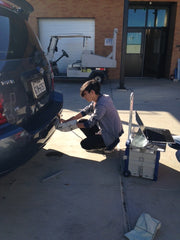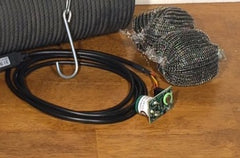
Accuracy, reliability, and consistency, are just a few of the requirements that many researchers and students are in search of when selecting the proper gas sensing technology. CO2Meter has been fortunate enough to work alongside a broad range of universities and students who continue to utilize our sensing solutions to advance in scientific fairs, innovations, and further discoveries.
One intriguing CO2Meter customer and regional science fair winner, Michael Trees, used our Alphasense 5,000ppm Carbon Monoxide (CO) Smart EC Sensor Development Kit to measure CO levels with the goal of reducing vehicle emissions.
Michael stated, "Currently, improving indoor air quality is a goal of the United States Environmental Protection Agency (EPA). For example, in 2014, the EPA released new standards meant to reduce vehicle emissions by 10 to 30 percent by 2030. The purpose of my study is to reduce carbon monoxide emissions in car exhaust from different engine types by using a filter I designed and constructed out of galvanized stainless steel sheeting and activated charcoal. In the end, I hope to reduce dangerous gasoline vehicle emissions and make the air cleaner."
CO2Meter was sure to work alongside Michael throughout his research as he used both the Alphasense CO Smart Sensor Development Kit and GasLab Software to further his research. The team at CO2Meter became fascinated with Michael's overall research and his end goal of creating a more sustainable and healthier environment. In addition to not only winning the regional science fair, Michael was also able to advance to the Regeneron International Science Fair, this past May.
CO2Meter was able to interview Michael Trees and gain further insight into his overall process within his project and the findings from the study while using our CO smart sensing technologies.
Picture of Michael during his Science Project
We interviewed Michael to bring perspective to his CO science project and the overall abstract of his research.
CO2Meter: Michael, could you tell us more about your research and the overall mission of the project?
Michael: "My name is Michael Trees. I started this research project for a 4-H project in early 2019. The project was based around cleaning carbon monoxide from vehicle exhaust. The mission of my project is to create a more affordable way to clean emissions and create a cleaner future for the world."
"I was able to clean CO from vehicle exhaust by using activated charcoal as a filter media. In the first year of my project, I just tested in the filter media using a rubber tailpipe adapter to hold packets filled with activated charcoal. This year, I built my own chamber out of sheet metal, rivets, and bolts."
CO2Meter: Could you dive into some of the research and overall process?
Michael: "The filter was attached to the tailpipe of 4 different vehicles with different engine types:
• 2006 Toyota Highlander (V6)
• 2008 Nissan Versa (Inline 4)
• 1995 Chevrolet Silverado (V8)
• 1998 Cummins Diesel (Inline 6)
The dependent variable was CO level in parts per million (ppm) as measured by an Alphasense 5,000 ppm Smart CO Sensor during 15-second intervals for 5 minutes, with readings taken every second."
CO2Meter: How has CO2Meter sensor technologies assisted in your overall research in helping provide measurement, solutions, and data logging to your study?
Michael: "I used the sensor to monitor CO levels that came out of a vehicle’s exhaust. I compared trials with and without the filter."
Photo of Alphasense CO Dev Kit and Michael's Attachment
CO2Meter: In your experience what has been the greatest change in your industry or most important aspect to your research?
Michael: "The most important aspect was that I was able to remove a significant amount of CO from 4 different vehicles. This is a first step in developing a filter that will reduce emissions and make the air cleaner"
CO2Meter: Why did you choose CO2Meter as a CO2 Sensor provider, and utilized them for your study?
Michael: "The sensor was affordable and able to withstand the environment that I used it in. I am 15 years old and had no problem understanding how to use the sensor properly or operating the software"
CO2Meter: What do the next 3-5 years look like from a CO2 perspective
Michael: "I am learning more about emissions and VOC’s, and eventually I would like to have a sensor that can help me measure several different types of gases at once."
CO2Meter: Overall what were the results from your study and what was the most fascinating aspect that was found?
Michael: "I was able to significantly reduce CO levels from four different engine types, including a diesel engine. Eventually, I will build a chamber that has different layers of filter media and can attach to the tailpipe while the vehicle is being driven".
"Results from t-test analyses of means indicated that CO levels were significantly lower with the filter for all four vehicles and engine types (p<.05). This study overall was designed to be the first step in building an affordable attachment aimed at reducing CO vehicle emissions and making the air cleaner."
Here's a more detailed of Michael's research.
- Alternative Hypothesis: If the filter was used, then CO levels would decrease when compared to levels without the filter.
- NULL Hypothesis: If the filter was used, then CO levels would not decrease when compared to levels without the filter.
- Results supported the Alternative Hypothesis, that carbon monoxide levels would decrease when the tailpipe filter was used. The filter significantly reduced CO for every vehicle tested. Previous research had indicated that activated charcoal used the process of adsorption to filter out the chemicals. The process of adsorption describes the chemical bonding of two substances. I believe the way my filter worked was that the advanced charcoal inside the chamber absorbed a portion of the CO on its porous surfaces as it was exiting the exhaust pipe.
In addition to the research and customer case studies that CO2Meter comes across, a huge factor when it comes to many projects is the need to measure across a variety of inert gas concentrations.
CO2Meter will continue to ensure that we provide the highest quality gas sensing solutions, educational resources, and technological advancements - to assist our customers and further scientific development in the future.
For more information visit our website or email us at Sales@CO2Meter.com or speak to an expert at (877) 678-4259.



